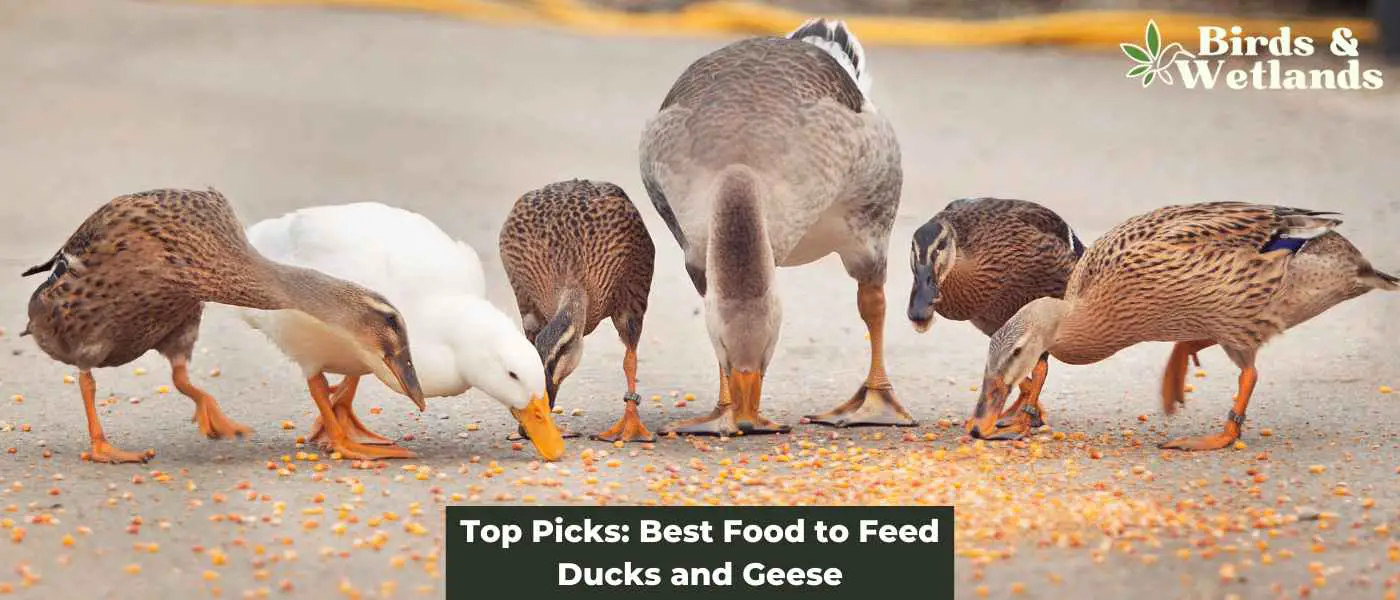Ducks and geese are a common sight in many parks and ponds. Feeding them is a popular activity for many people, especially children. However, not all foods are suitable for these birds.
In fact, some foods can be harmful to their health.
So, what is the best food to feed ducks and geese?
The best food to feed both ducks and geese includes a balanced diet of high-quality commercial feed, vegetables, and grains. Offer species-specific pellets or crumbles as their primary food source. Supplement with healthy treats like chopped lettuce, peas, corn, oats, and halved seedless grapes. Avoid feeding them bread, as it lacks nutritional value and can cause health issues.
Key Takeaways:
Provide a balanced diet with commercial feed, vegetables, and grains
Offer species-specific pellets or crumbles as the primary food source
Supplement with healthy treats; avoid bread due to its lack of nutrition
Why It’s Important to Feed Ducks and Geese the Right Food
Feeding ducks and geese the wrong food can cause health problems and harm the environment.
Natural Diet of Ducks and Geese
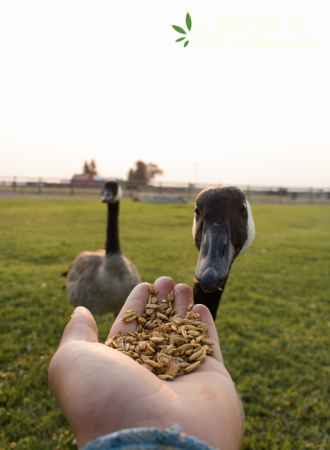
Ducks and geese have a natural diet that consists of aquatic vegetation, insects, and other small animals. Wild ducks eat a variety of natural foods, including seeds, fruits, and nuts. Domestic ducks and geese should be fed a balanced diet that includes duck feed or chicken feed, which contains all the necessary nutrients for healthy growth.
Best Waterfowl Feed
Delightful Feeding Experience
Transform your backyard into a scenic waterfowl habitat and enjoy an interactive feeding experience with Natural Waterscapes Waterfowl Floating Food.

Pros
- Nutritious Food: Natural Waterscapes Waterfowl Floating Food is specifically designed to provide essential nutrients to waterfowl, including swans, geese, and ducks, helping them maintain a healthy diet.
- Convenient: The food comes in resealable packaging, making it easy to store and use as needed. It is also easy to handle and transport.
- Floating Formula: The floating formula of the food allows it to remain on the surface of the water, making it easier for waterfowl to eat and minimizing the risk of water contamination.
- Attracts Waterfowl: The food is formulated to attract various waterfowl species, including swans, geese, and ducks, to your pond, lake, or other water body, providing an opportunity to observe and enjoy these beautiful creatures.
- Environmentally Friendly: Natural Waterscapes Waterfowl Floating Food is made with environmentally friendly ingredients and does not contain any harmful preservatives, making it safe for both waterfowl and the environment.
Cons
- Shelf Life: The food’s shelf life may be limited compared to other types of waterfowl food due to its natural ingredients and lack of preservatives. This means you may need to use it up quickly after opening the package to prevent it from going bad.
The Best Foods to Feed Ducks and Geese
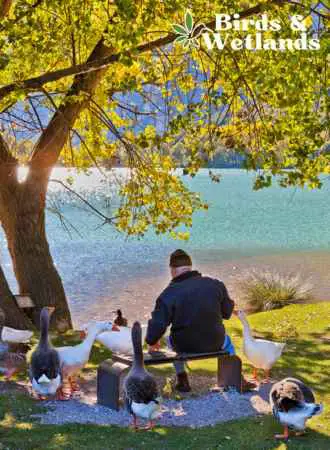
When it comes to feeding ducks and geese, it is important to provide them with a balanced diet that meets their nutritional needs. Here are some of the best foods to feed ducks and geese:
Aquatic Plants
Ducks and geese love to eat aquatic plants, such as duckweed, water lettuce, and water hyacinth. These plants are a good source of vitamins, minerals, and fiber, and they also help to keep the water clean.
Small Fish
Small fish, such as minnows and goldfish, are a great source of protein for ducks and geese. However, it is important to make sure that the fish are not contaminated with pollutants or chemicals.
Duck Feed Pellets
Duck feed pellets are a convenient and nutritious option for feeding ducks and geese. These pellets are specially formulated to meet the nutritional needs of waterfowl and can be found at most pet stores or feed supply stores. Ducks eat chicken feed as well which is useful if you have a mixed flock.
Best Duck Feed Pellets
Are you a duck owner looking for the perfect feed to keep your feathered friends happy and healthy? Look no further than Purina Duck Feed Pellets! With their nutritionally balanced formula and high-quality ingredients, these pellets are the ultimate solution for providing your ducks with the nutrition they need to thrive.
Pros
- Complete Nutrition: Purina Duck Feed Pellets are nutritionally balanced to provide all the essential vitamins and minerals that ducks need to stay healthy and strong.
- Easy to Digest: The pellets are specially formulated to be easy to digest, which makes them ideal for ducks of all ages.
- Promotes Growth and Development: With its balanced nutrition formula, Purina Duck Feed Pellets are designed to support healthy growth and development in ducks.
- Suitable for All Breeds: Whether you have domestic ducks or wild ducks, Purina Duck Feed Pellets are suitable for all breeds of ducks.
- Trusted Quality: Purina has been producing high-quality animal feed for over 100 years, so you can trust that your ducks are getting the best possible nutrition with Purina Duck Feed Pellets.
Cons
- Cost: Compared to other types of duck feed on the market, Purina Duck Feed Pellets can be slightly more expensive. However, many customers feel that the high-quality ingredients and balanced nutrition formula are worth the extra investment.
- Pellet Size: Some customers have noted that the pellet size of Purina Duck Feed Pellets can be quite large, which may not be suitable for smaller or younger ducks. However, many customers have reported that the pellets can easily be broken up or soaked in water to make them easier to eat.
Freeze-Dried Crickets
Freeze-dried crickets are a tasty and high-protein treat for wild birds. These can be found at pet stores or online and can be fed to ducks and geese in small quantities as a supplement to their regular diet.
Leftover Food
Ducks and geese can also be fed leftover food, such as bread, pasta, and vegetables. However, it is important to avoid feeding them foods that are high in salt, sugar, or fat, as these can be harmful to their health.
Best Foods for Geese and Ducks
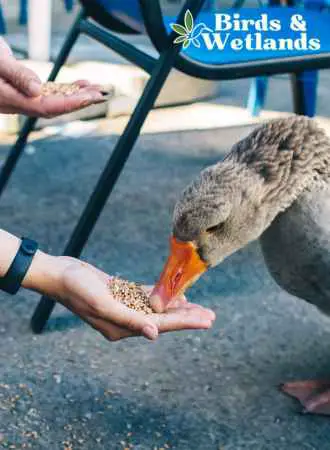
1. Cracked Corn
Cracked corn is an excellent food source for ducks and geese. It is high in carbohydrates, which provide them with the energy they need for their daily activities. Cracked corn is easy to digest and is often less expensive than other feed options, making it a cost-effective choice for waterfowl owners.
2. Peas
Peas are a nutritious and tasty option for ducks and geese. They are rich in vitamins, minerals, and protein, making them a wholesome choice for their diet. Peas can be served fresh, frozen, or cooked, and are an excellent addition to a balanced diet. They also promote healthy digestion and provide essential nutrients for growth and maintenance and ducks love frozen peas.
3. Barley
Barley is a beneficial grain for ducks and geese due to its high fiber and protein content. It helps to promote healthy digestion, maintain a healthy weight, and support overall well-being. Barley can be soaked, sprouted, or cooked before being fed to your waterfowl, providing them with essential nutrients for optimal growth and health.
4. Oats
Oats are another valuable grain for ducks and geese. They are packed with essential nutrients, such as fiber, protein, and vitamins, which contribute to a healthy and balanced diet. Oats can be fed whole, rolled, or crushed, and can be mixed with other grains for variety.
5. Wheat
Wheat is a nutritious and energy-rich grain for ducks and geese. It is high in carbohydrates, protein, and essential vitamins and minerals, making it an excellent addition to their diet. Wheat can be fed whole or cracked and can be mixed with other grains to provide a well-rounded meal.
6. Rice
Rice, particularly brown rice, is a wholesome food for ducks and geese. It is a good source of carbohydrates, providing energy for their daily activities. Brown rice also contains essential nutrients, such as fiber, vitamins, and minerals, which contribute to a balanced diet.
7. Millet
Millet is a nutritious and easily digestible grain for ducks and geese. It is high in protein, fiber, and essential vitamins and minerals, promoting healthy growth and digestion. It is also a natural source of antioxidants, which support overall health and well-being.
8. Lettuce
Lettuce is a healthy and hydrating food option for ducks and geese. It is high in water content and provides essential nutrients, such as vitamins A, C, and K. Lettuce can be fed fresh and chopped into small pieces, making it easy for your waterfowl to consume.
9. Kale
Kale is a nutritious leafy green that is beneficial for ducks and geese. It is packed with vitamins, minerals, and antioxidants, contributing to a well-rounded diet. Kale can be fed fresh, chopped, or cooked, and is easily digestible for your waterfowl.
10. Spinach
Spinach is another healthy leafy green for ducks and geese. It is rich in essential nutrients, such as vitamins A,C, K, and iron, making it a valuable addition to their diet. Spinach can be fed fresh, chopped, or cooked, and provides essential nutrients for growth, maintenance, and overall health.
11. Cabbage
Cabbage is a nutritious and fibrous vegetable that is beneficial for ducks and geese. It is high in vitamins, minerals, and antioxidants, which contribute to a balanced diet. Cabbage can be fed fresh, chopped, or cooked, and is easily digestible for your waterfowl.
12. Broccoli
Broccoli is a healthy and nutrient-dense food option for ducks and geese. It is packed with vitamins, minerals, and antioxidants, which help support overall health and well-being.
13. Carrots
Carrots are a nutritious and tasty treat for ducks and geese. They are rich in vitamins, minerals, and fiber, which contribute to a balanced diet.
14. Squash
Squash is a healthy and versatile food option for ducks and geese. It is high in vitamins, minerals, and fiber, providing essential nutrients for a balanced diet.
15. Pumpkin
Pumpkin is a nutritious and seasonal treat for ducks and geese. It is rich in vitamins, minerals, and fiber, which contribute to a well-rounded diet.
16. Grapes
Grapes are a delicious and hydrating treat for ducks and geese. They are high in water content and provide essential vitamins and minerals, making them a healthy addition to their diet.
17. Berries
Berries, such as strawberries, blueberries, and raspberries, are a nutritious and tasty treat for ducks and geese. They are high in vitamins, minerals, and antioxidants, which contribute to a balanced diet. Berries can be fed fresh or frozen and provide essential nutrients for growth, maintenance, and overall health.
18. Watermelon
Watermelon is a hydrating and nutrient-rich treat for ducks and geese. It is high in water content and provides essential vitamins, minerals, and antioxidants. Watermelon can be fed fresh, with the seeds and rind removed, and is easily digestible for your waterfowl.
What is the best food for female ducks?
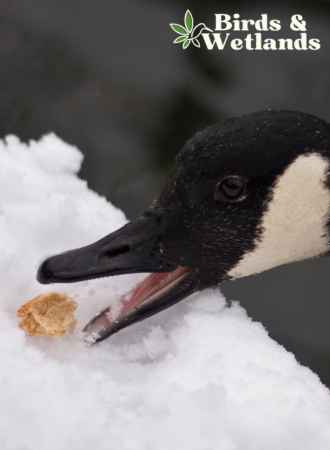
The best food for female ducks consists of a well-balanced and nutritious diet that supports their overall health and specific needs during different life stages. Female ducks, especially those that are laying eggs, require a diet that is high in protein, vitamins, and minerals to support egg production and maintain their health.
A balanced diet for female ducks should include a mix of grains, such as cracked corn, oats, barley, wheat, rice, and millet. These grains provide essential carbohydrates, protein, and fiber, which contribute to their overall health. Supplementing their diet with vegetables, leafy greens, and fruits such as peas, lettuce, kale, spinach, cabbage, carrots, squash, pumpkin, grapes, and berries will help ensure they receive the necessary vitamins and minerals.
For laying ducks, it is essential to provide a high-quality layer feed that contains around 16-18% protein and is fortified with calcium, phosphorus, and other essential vitamins and minerals. This specialized feed will support egg production, strong eggshells, and maintain the health of the female ducks.
Providing fresh water at all times and access to grit or crushed oyster shells for calcium supplementation is also crucial for female ducks’ overall health and well-being.
What is the best food for young ducks and geese?
Young birds, also known as ducklings and goslings, have specific nutritional requirements to support their rapid growth and development. The best food for them consists of a well-balanced and nutrient-dense diet that provides the essential nutrients they need during their early life stages.
For both ducklings and goslings, it is crucial to provide a high-quality starter feed that is specifically formulated for waterfowl. These feeds typically contain around 18-22% protein, which is essential for their rapid growth and development.
What Not to Feed Ducks and Geese
Avoid Bread and Other Human Foods
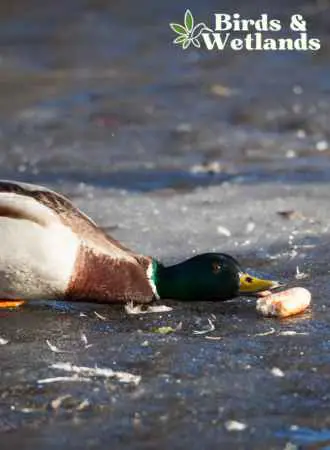
Feeding ducks and geese too much bread is not recommended. Bread has little nutritional value and can cause digestive problems.
Uneaten food can attract rats and other animals, which can spread disease. It’s best to avoid feeding ducks and geese human food, including chips, crackers, and other processed snacks.
Health Problems
Feeding ducks and geese the wrong food can lead to health problems, including metabolic bone disease and duck plague. Metabolic bone disease is caused by a lack of calcium and vitamin D in the diet, which can lead to weak bones and deformities. Duck plague is a viral disease that can be spread through contaminated water and food.
Environmental Impact
Feeding ducks and geese too much food can harm the environment. Uneaten food can pollute the water and cause algae blooms. Algae blooms can reduce the amount of oxygen in the water, which can kill fish and other aquatic animals.
While feeding ducks and geese can be a fun experience, it’s important to remember that not all foods are safe for these birds to eat. Feeding them the wrong foods can lead to health problems and even death. Here are some foods to avoid when feeding ducks and geese:
Junk Foods
Feeding ducks and geese junk food, such as chips, crackers, donuts, and popcorn, is not a good idea. These foods are not nutritious and can lead to health problems, including obesity and malnutrition. Instead, consider feeding them healthier options, such as vegetables and grains.
Citrus Fruits
Citrus fruits, such as oranges and lemons, are not safe for ducks and geese to eat. The high acid content in these fruits can cause digestive problems and lead to dehydration. Avoid feeding them any fruits from the citrus family.
Uncooked Rice
Contrary to popular belief, feeding ducks and geese uncooked rice is not harmful to them. However, it’s not a good idea to feed them large amounts of uncooked rice as it can swell up in their stomachs and cause digestive problems.
Twist Ties and Plastic Clips
Feeding ducks and geese foods that are wrapped in twist ties or plastic clips is not safe. These items can cause digestive problems and even lead to death if ingested.
Bread Products
Feeding bread products, such as bread crumbs and stale bread, is not a good idea. When you feed ducks bread, it is not nutritious and can lead to health problems, including obesity and malnutrition. Instead, consider feeding them healthier options, such as vegetables and grains, especially when you feed wild ducks.
Nightshade Family
Feeding ducks and geese foods from the nightshade family, such as tomatoes and potatoes, is not safe. These foods contain solanine, which is toxic to birds and can cause digestive problems and even death if ingested.
Chopped Lettuce
Feeding ducks and geese chopped lettuce is not a good idea. While lettuce is generally safe for birds to eat, chopped lettuce can be difficult for them to swallow and can lead to choking.
Remember, when feeding ducks and geese, it’s important to provide them with nutritious foods that are safe for them to eat. Avoid feeding them junk foods, citrus fruits, uncooked rice, twist ties, plastic clips, bread products, nightshade family, and chopped lettuce. Instead, consider feeding them healthier options, such as vegetables and grains.
How to Feed Ducks and Geese
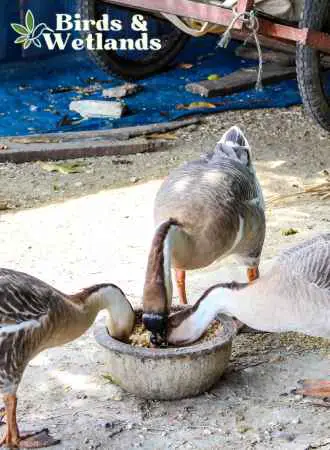
While feeding ducks and geese can be a fun activity, it’s important to use caution when doing so. Here are some tips to keep in mind:
Don’t feed ducks and geese near roads or other hazards.
Don’t feed ducks and geese in areas where they may become a nuisance to others.
Stop feeding the wild ducklings and birds if they have too much duck food. Overfeeding can lead to health problems.
Don’t feed ducks and geese food that is bad or spoiled.
Don’t feed ducks and geese food that has been contaminated with chemicals or other toxins.
Don’t feed bread to ducks or other waterfowl at local ponds.
Best Overall Duck Feeder -FeatherEase Automatic Chicken Waterer & Feeder
Simplify Your Poultry Care with One Smart Solution!
Enhance your poultry care with the FeatherEase Automatic Chicken Waterer & Feeder, a convenient and efficient solution designed to keep your ducks and chickens well-fed and hydrated.

Pros
- Simplify your poultry care routine: Dual-function design combines an automatic waterer and feeder in one convenient unit.
- Save time and effort: Large feeder and waterer capacities reduce the need for frequent refill.
- Save money: Innovative no-waste feeding system minimizes feed spillage and waste.
- Long lasting: Food-grade, BPA-free materials ensure the safety and health of your poultry, while the durable constructio.
- Easy-to-assemble and maintain design simplifies the process of keeping your poultry hydrated and well-fed.
Cons
- Users with hard water may experience difficulty in separating the inner cup from the main cup of the waterer due to mineral buildup.
- The feeder’s holes may be too large for some users, allowing chickens to scatter food out, which could result in waste.
- The waterer may not function effectively in colder climates, requiring alternative solutions during the winter months.
FAQS on What Can Ducks and Geese Eat?
What should you not feed ducks and geese?
It is essential to avoid feeding ducks at the pond in your local park and geese certain foods that can be harmful to their health. These include bread, crackers, cookies, popcorn, and other processed foods, as they lack nutritional value and can lead to health issues such as malnutrition and obesity. Avoid feeding them chocolate, avocado, onions, garlic, and caffeine, as these foods can be toxic to waterfowl.
What do wild ducks and geese like to eat?
Wild ducks and geese have a diverse diet that consists of a variety of natural foods. They typically feed on aquatic plants, seeds, grains, small fish, insects, snails, and other invertebrates. The specific diet of wild ducks and geese may vary depending on their habitat, season, and availability of food resources. Providing a diet that mimics their natural food sources is essential to maintain their health and well-being.
What is the best food for ducks and geese in the winter?
During the winter months, our feathered friends e require extra energy to maintain their body temperature and overall health. It is crucial to provide them with high-energy and nutrient-dense foods during this time. Some of the best foods for ducks and geese in the winter include cracked corn, barley, wheat, and oats. These grains are high in carbohydrates and provide the energy they need to stay warm and healthy.
What are the best grains for ducks and geese?
Grains are a significant component of a duck’s and goose’s diet, providing them with essential nutrients and energy. Some of the best grains for ducks and geese include cracked corn, barley, oats, wheat, rice, and millet. These grains are rich in carbohydrates, protein, fiber, vitamins, and minerals, which contribute to a balanced and nutritious diet.

